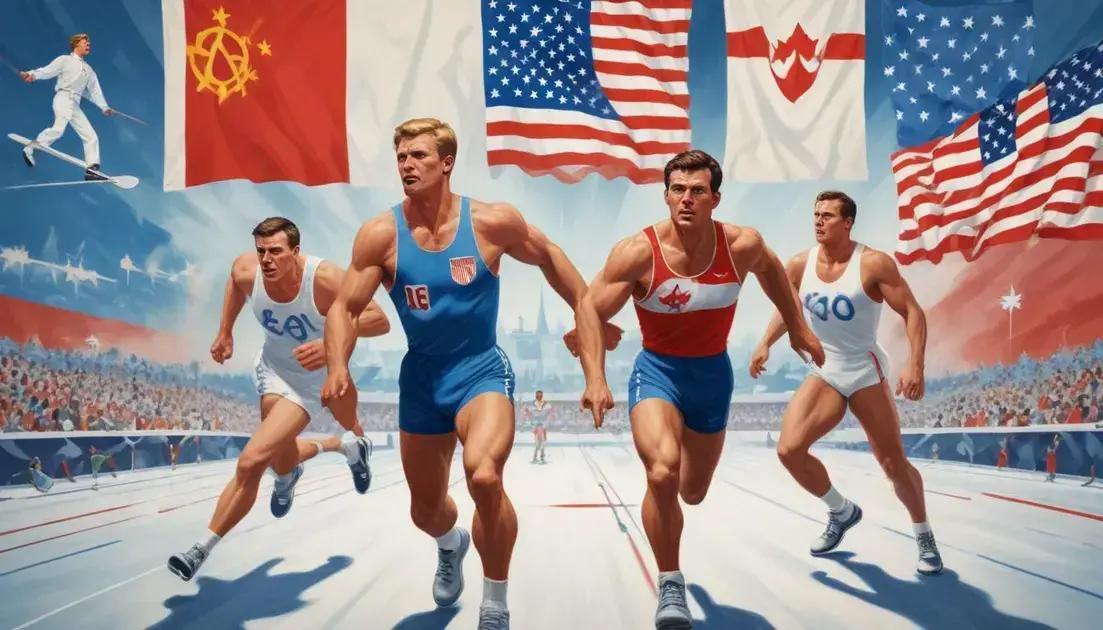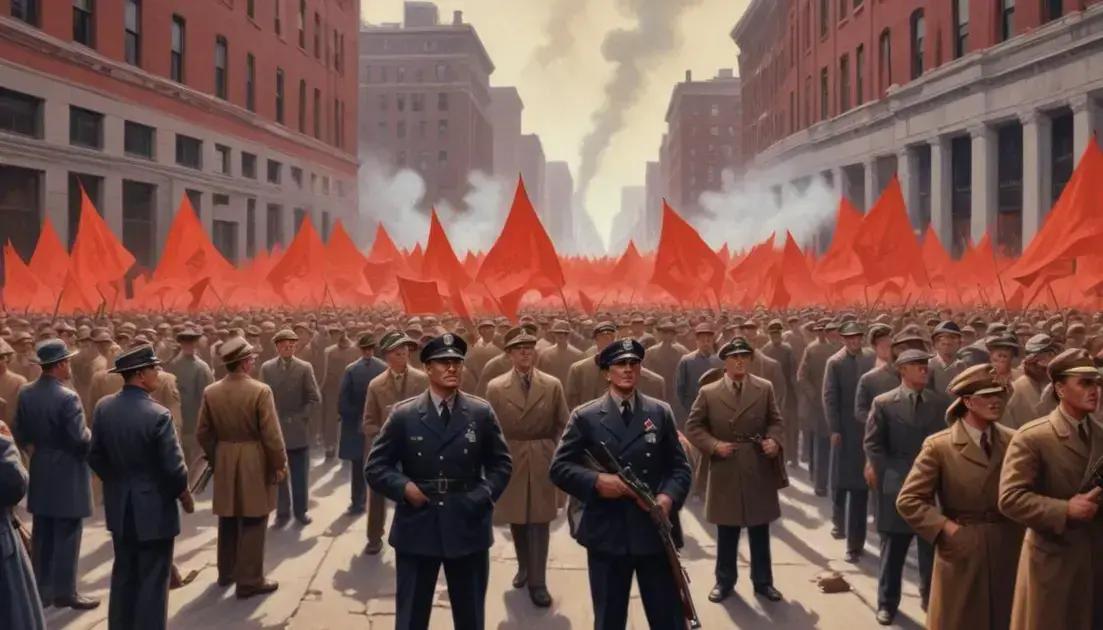
The Cold War Olympics: When Sports Became a Weapon
The Cold War Olympics were marked by political tensions that turned sports into battlegrounds for ideology. Major events like the boycotts of the 1980 Moscow and 1984 Los Angeles Olympics illustrated how national pride and propaganda intertwined. Athletes, such as Tommie Smith and Muhammad Ali, became political symbols through their actions, highlighting social issues and inspiring change. These Olympic Games not only showcased athletic excellence but also reflected significant historical conflicts and the use of sports as a platform for political expression.
The Cold War Olympics represent a fascinating chapter in sports history, where competition transformed into a geopolitical battleground. Have you ever wondered how sports became a tool of propaganda?
The role of sports during the Cold War
During the Cold War, sports became much more than just games. They were a way for countries to show their strength. The Olympic Games were often used as a stage for political showdowns. Countries wanted to prove they were the best, and winning medals was about more than just pride.
Global Rivalries
The fierce competition between the United States and the Soviet Union defined this era. Each superpower saw success in sports as a reflection of their political ideologies. For instance, the U.S. focused on capitalism and individualism while the Soviets promoted teamwork and communism. This rivalry created a suspenseful atmosphere at the Olympics.
Symbol of National Pride
Winning a gold medal was a symbol of national pride. Athletes were viewed as heroes. They were not just competing for themselves but for their entire country. This made the stakes even higher. Every win was celebrated, and every loss was deeply felt.
Sports as Propaganda
Governments used sports to boost their image. They highlighted their victories in the media to rally support at home. This use of sports as propaganda was common. Events like the Olympics turned into showcases of the nation’s achievements and values.
Each Olympic Games during the Cold War had its own tense moments. The boycotts of the 1980 and 1984 Olympics are prime examples. These events showed just how intertwined politics and sports became during this time.
Major Olympic events impacted by political tensions
Major Olympic events have often been heavily influenced by political tensions. These games were not just about athletic competition; they served as a backdrop for powerful messages and disputes. The 1936 Berlin Olympics are a prime example. Hitler used this event to promote Nazi propaganda and showcase Germany’s power.
The 1980 Moscow Olympics
In 1980, political tensions led to a significant boycott of the Moscow Olympics. The United States led the charge, pulling out to protest the Soviet invasion of Afghanistan. This decision meant that many top athletes missed the chance to compete on a world stage.
The 1984 Los Angeles Olympics
In response, the Soviet Union organized a boycott of the 1984 Los Angeles Olympics. They claimed it was unsafe for their athletes. This tit-for-tat showed how deeply politics affected the Olympics.
Other Notable Events
Many other Olympics experienced similar issues. The 1968 Mexico City Games featured the iconic Black Power salute. American athletes Tommie Smith and John Carlos raised their fists on the podium to protest racial inequality. This moment became a powerful symbol of the civil rights movement.
Another notable event was the 1972 Munich Olympics, where a tragic terrorist attack stunned the world. Eleven Israeli athletes were taken hostage and killed. This tragedy highlighted the intersection of sports and global politics.
Each of these examples shows how the Olympic Games became a platform for political expression. Events shaped by these tensions still resonate today.
Propaganda and national pride in Olympic history
Propaganda and national pride have played major roles in Olympic history. Countries have used the Games to project their values and showcase their achievements. The Olympics become a platform for nations to unite and express pride in their athletes.
Using Sports for Propaganda
Governments often highlight their athletes’ success to create a sense of unity. For example, the Soviet Union showcased its athlete dominance during the Cold War. This strategy was aimed at proving the superiority of communism over capitalism.
The Role of Media
Media coverage of the Olympics also adds to the sense of national pride. Stories about athletes overcoming struggles often inspire viewers back home. These narratives help build a bond between athletes and their supporters.
Iconic Moments of National Pride
Some moments in Olympic history stand out as symbols of national pride. When Jesse Owens won four gold medals in 1936 Berlin, it was a major blow to Nazi propaganda. His achievements inspired many and challenged racial stereotypes.
More recently, the U.S. women’s gymnastics team celebrated their gold medals in 2016. They showed not just skill but also the strength of female athletes, leading to greater recognition for women in sports.
These moments highlight how propaganda and national pride intertwine at the Olympics. They create stories that resonate well beyond the sports world.
Athletes as political symbols
Athletes have often served as powerful political symbols. Their actions and achievements can inspire change or protest. Their statuses go beyond sports as they represent their countries and ideologies.
Examples of Political Expression
One iconic moment was at the 1968 Mexico City Olympics. Tommie Smith and John Carlos raised their fists during the medal ceremony to protest racial injustice. This gesture became a symbol for the civil rights movement.
Influence on Society
Sports figures like Muhammad Ali have also used their platforms for political statements. Ali refused to fight in the Vietnam War, which sparked a nationwide debate about patriotism and rights. His stand highlighted the conflicts between personal beliefs and national expectations.
Athletes and National Movements
In many cases, athletes have become faces of national pride. Usain Bolt’s success at the Olympics has made him a symbol of Jamaican culture and optimism. His performances unite people and create a sense of national pride.
Similarly, when athletes use their fame to advocate for social issues, they influence public opinion. This trend is increasingly visible in recent years, with many athletes speaking out on various issues, including equality and climate change.
Through their actions and voices, athletes often reflect the issues of their time. They become integral parts of larger political movements.
Case studies: The 1980 and 1984 Olympics
The 1980 and 1984 Olympics illustrate how politics can overshadow sports. Both events were marked by boycotts, affecting the athletes and the Games themselves.
1980 Moscow Olympics Boycott
The United States led a boycott of the 1980 Moscow Olympics. This action was in response to the Soviet invasion of Afghanistan. Over 60 countries did not participate, including many from Western Europe.
Impact on Athletes
This boycott denied many athletes their chance to compete. Some top U.S. athletes had trained for years, only to miss the opportunity to showcase their talent. It was a painful decision for many.
1984 Los Angeles Olympics Response
In retaliation for the 1980 boycott, the Soviet Union organized a boycott of the 1984 Los Angeles Olympics. Many Eastern Bloc countries stayed home. They claimed security concerns, but it was a clear political move.
Consequences for the Games
Both boycotts changed the Olympic landscape. These events showed how international relations can impact athletic competition. They also sparked discussions about using sports for political messages.
Despite the challenges, the 1984 Olympics succeeded financially. The Games welcomed many athletes and garnered significant public interest. These events paved the way for future discussions on politics and sports.
Conclusion
In conclusion, the Olympic Games have always been more than just sports. They reflect the struggle between nations and the power of political expression. Events like the boycotts of the 1980 Moscow and 1984 Los Angeles Olympics show how deeply intertwined sports and politics can be.
Athletes like Tommie Smith, Carlos, and Muhammad Ali have used their platforms to bring attention to important issues. Their actions remind us that athletes can be powerful symbols of change.
By understanding this history, we see how the Olympics can unite and divide us. They can spark pride or highlight injustice. Ultimately, the Games serve as a reminder of the deeper social and political currents that shape our world. Recognizing these aspects can lead to more meaningful conversations about sports and society today.


